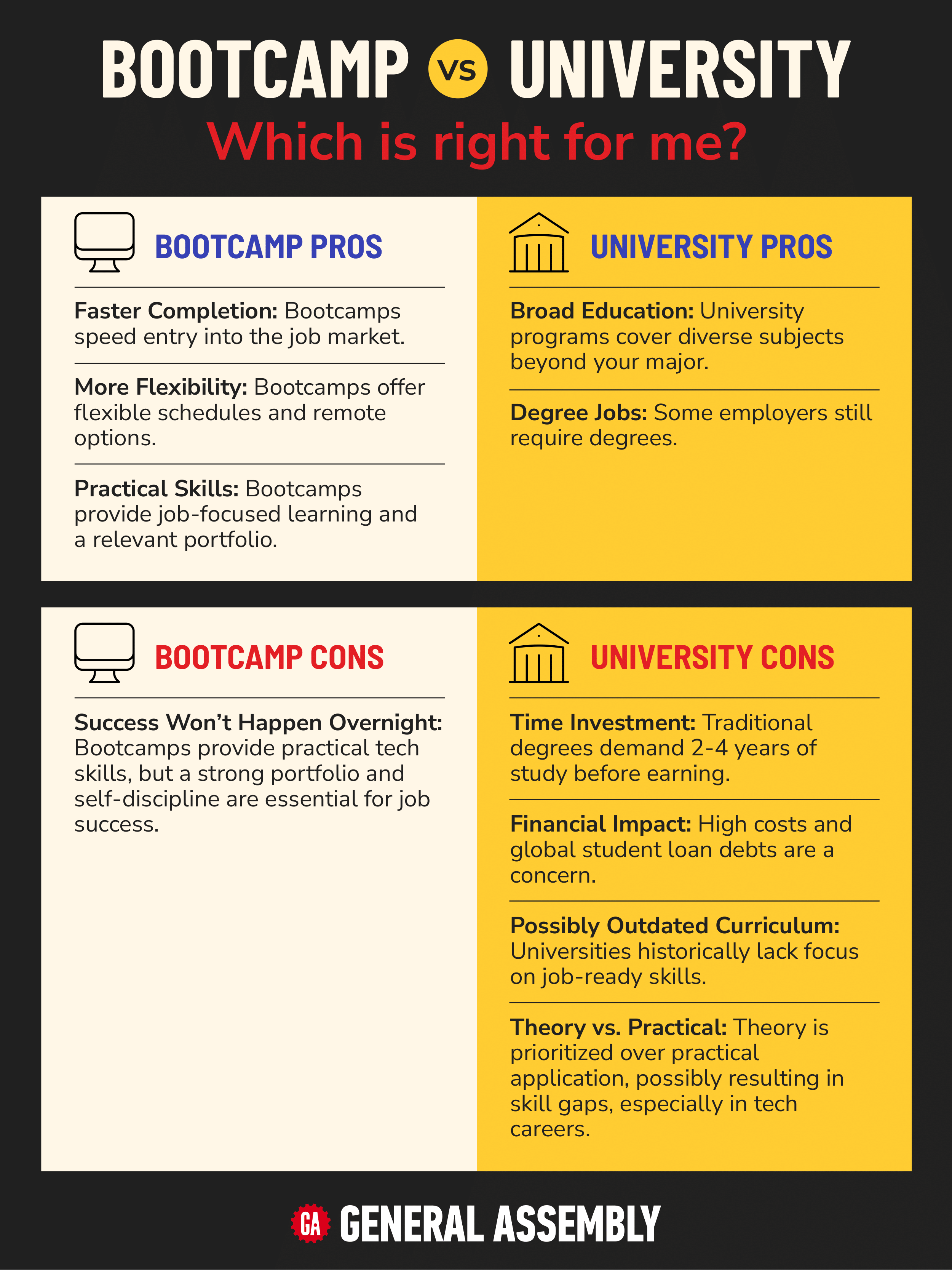
Tech skills are in high demand, leading many people to consider going back to school for tech skills. Most of the fastest growing roles today are tech related, including AI and machine learning specialists, data analysts, and systems engineers, according to The World Economic Forum.
So, you might be wondering: what’s the best way to go about gaining those skills? Should you take the higher education route and go back to university? Should you do a tech bootcamp? Are tech bootcamps really worth it?
It’s important to choose the right education path based on your circumstances and learning style. Let’s dive into the details of a coding bootcamp vs. degree and help you determine which is right for you.
What is a tech bootcamp?
A tech bootcamp is an intensive program that can last weeks or months. You’ll learn the practical skills required for a career in tech, collaborate with your classmates on group projects for your portfolio, and learn strategies to help you land a job in your chosen field. Bootcamps tend to be highly focused on job-ready skills and can adapt their curriculum quickly to align with job market trends. For example, General Assembly’s Data Analytics Bootcamp and Software Engineering Bootcamp now incorporate a focus on generative AI, including writing SQL queries and debugging Python code using ChatGPT.
Here are a few more key details about tech bootcamps:
- They prioritize training so you make an immediate impact in a new role – graduates are typically equipped with in-demand skills and qualified for entry-level roles.
- They can help you earn the same salary as college graduates, without the costly investment and time commitment a traditional university degree requires.
Most graduates from General Assembly bootcamps who participate in our Full-Time Career Services program (95.7%) work in their field of study—with 93.2% accepting an offer within a year of graduation. On the other hand, only 46% of college graduates currently work in their field of study, according to a survey by Intelligent.com. And 53% of college graduates are unemployed or in jobs that don’t actually require a degree, a study from the University of Washington found.
University vs. tech bootcamp: pros and cons
Tech bootcamps and university programs can both lead to highly paid tech jobs, but which one is right for you?

Let’s break down the pros and cons.
Tech Bootcamp: Pros
- Shorter time invested: Tech bootcamps can last just a few weeks or months, meaning you’re done studying and ready to enter the job market quickly. You’ll start earning a paycheck faster.
- Flexibility: Tech bootcamps tend to offer more flexibility than traditional degree programs. They are offered on more frequent schedules, meaning you aren’t beholden to twice-a-year start dates, and you can choose from flexible schedules ranging from full-time to part-time. Many tech bootcamps also offer opportunities for remote learning.
- Learn practical skills: At a tech bootcamp, you’ll cancel out the pointless electives required by a university degree and learn practical skills directly applicable to the job you want. You’ll also graduate with a portfolio of relevant work that demonstrates your skills.
- Save money: Many tech bootcamps cost less than one semester of a university degree program.
Tech Bootcamp: Cons
- Tech bootcamps aren’t a magic bullet: Graduating from a tech bootcamp provides you with practical technical or coding knowledge, but you’ll still need to show employers a strong portfolio to land a great job. Most tech bootcamps offer the chance to create portfolio projects, and many offer career coaching services for graduates. You’ll need to have the self discipline to put in the effort needed to build your portfolio and invest in your job search.
University: Pros
- Well-rounded education: At a university degree program, you’ll study a wide range of subject matters, including topics that aren’t directly related to your chosen field of study.
- Access jobs requiring a degree: While some employers continue to require degrees for certain jobs, this group is shrinking. The percentage of jobs requiring a college degree dropped from 51% in 2017 to 44% in 2021, according to The Burning Glass Institute.
University: Cons
- More time learning, less time earning: It can take two to four years of studying to earn a traditional degree and start earning a salary.
- High costs and student loan debt: The cost of attending a university has ballooned around the globe, and people who don’t want to be saddled with debt are rethinking the value of college.
- In 2023, the average federal student loan debt in the US was about $37,650.
- In the UK, students incurred an average of 44,940 British pounds.
- In Australia, average student debt increased from $15,200 in 2021-22 to $24,800 in 2023.
- In India, high annual interest rates on educational loans range from 7.30% to 16%.
- In Bahrain, the cost of a bachelor’s degree program ranges from $2,000 to $8,000 BHD per year.
- Potentially outdated curriculum: Historically, universities have not emphasized job-readiness in their curricula. In today’s rapidly evolving job market, this means you might not learn the most recent in-demand skills.
- Theory vs. practical: University degrees tend to emphasize theory over practical application. This can be critical if you are planning to pursue a career in academic research but it can leave you missing practical skills needed to land a job in tech. According to Switchup, some coding bootcamps have higher in-field employment rates than well-known computer science universities, including Stanford, MIT, and the California Institute of Technology.
Which path is right for you?
When determining whether a university degree or a tech bootcamp is right for you, consider your career goals, learning style, financial situation, and personal circumstances.
Ask yourself:
- Does the job you want require a degree or specific skills?
- Do you prefer to learn in an immersive, hands-on environment or a more traditional classroom setup?
- Do you have the time and resources to commit to a more extended university program, or do you need to enter the workforce quickly?
- Are there any family or personal obligations that could impact your timeline or decision?
Not ready for a full-time bootcamp or just looking to accelerate your career vs. completely change it? Other options include short, part-time courses that teach you in-demand skills on evenings, weekends or during accelerated courses, and flexible, self-directed online learning.
Everyone approaches learning differently, and there’s no one-size-fits-all solution to education. Clarifying your goals and knowing what motivates you as a learner can help you decide which path to take. Regardless of what you choose, continuing your education can only serve to benefit your career (and paycheck), so embark on this journey with confidence.
Is a tech bootcamp the right path for you? Try before you buy with a free workshop or contact us today to learn more.